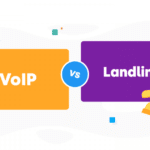Start using VoIP telephony in your business

VoIP telephony reduces your business costs – it does not require any complex installation processes and maintenance and it allows you to make phone calls via the Internet from anywhere and using any device.
VoIP means Voice over Internet Protocol, so VoIP telephony can be easily defined as making phone calls over the Internet. VoIP telephony allows the transfer of voice phone calls over the Internet instead of using traditional analog transfer through a standard telephone line which we know from the past.
Modern VoIP telephony allows you to call any phone number:
- local or international
- mobile or fixed network
- regardless of the distance
In VoIP telephony, voice is converted into digital signal which is then transferred over the Internet. If you dial a traditional phone number, digital signal is re-converted to voice signal before reaching the target. The transfer is similar to the transfer of other types of data, e.g. emails.
The switch from standard mobile or fixed network to VoIP telephony is simple. The only thing you need is software that allows VoIP telephony to transmit phone calls over the Internet.
Does your jaw clench when you hear the word software because of complicated installations and sky-high fees? No need to be worried. A major benefit of VoIP technology is that calls can be made over the phone, tablet or computer as long as you have Internet connection and you can start using VoIP telephony just minutes after set-up.
Here, you can watch our brief video guide on VoIP technology:
Benefits of VoIP over traditional telephony
Companies all over the world have been switching to VoIP telephony not only to make internal phone calls (the so-called business phone system), but also to receive calls coming into the call center or to make outbound calls during active call center campaigns.
VoIP telephony for business creates a vast range of benefits for your business. Here are the three major ones:
1. Reduced costs
It’s cheaper to use VoIP telephony than to make conventional phone calls. As VoIP telephony does not require special hardware, it doesn’t require regular maintenance either. Phone calls are channeled over the Internet instead of phone networks.
2. Flexibility and portability
Once you complete the one-time installation of VoIP telephony software in your computers, tablets or phones, you can start receiving standard phone calls made over telecommunication networks over the Internet. It does not matter how many phones or phone numbers you use.
The only thing you need to fully use the call center software and VoIP telephony is Internet access. That means you and your employees can work from anywhere.
3. Easy installation and use
The fact that the software is easy to install (basic IT know-how is all you need) and the VoIP technology is mobile offers more advantages than traditional phones.
VoIP technology for large and small businesses
Providing high-quality customer service is one of the key factors contributing to the success of your company. One of the ways to improve the quality of customer service is making the switch to VoIP technology.
Small businesses believe that good customer service requires every incoming call to be answered immediately. Larger companies want to make sure that technology is in place so the customer can reach the right agents.
With VoIP technology, it does not matter whether you are manage a large or small company – VoIP allows large companies to maximize efficiency and small businesses to solve their problem with answering every call.
Using VoIP means efficiency, reliability and reduction of call duration.
The following services also use VoIP telephony:
Improve customer experience with VoIP technology
As we already mentioned, customers’ experience with your service is one of the key factors decisive for business success. Your clients spread the word and tell their friends about their experience with your company.
By using all opportunities provided by VoIP technology, you can create unique customer experience with your customer support:
- IVR – automated voice telephone system that communicates with the caller
- Caller Queues – incoming calls are routed into caller queues based on pre-defined rules and distributed to available agents within the right group
- Possibility of integrations

























